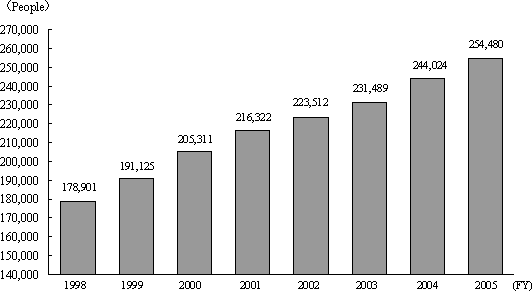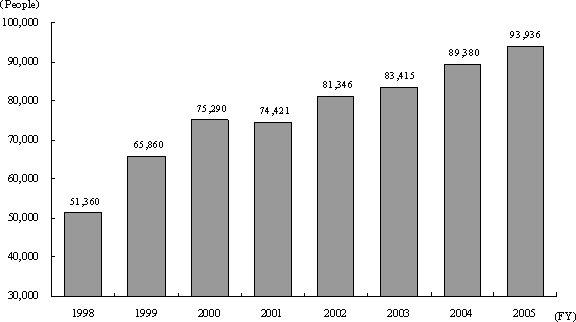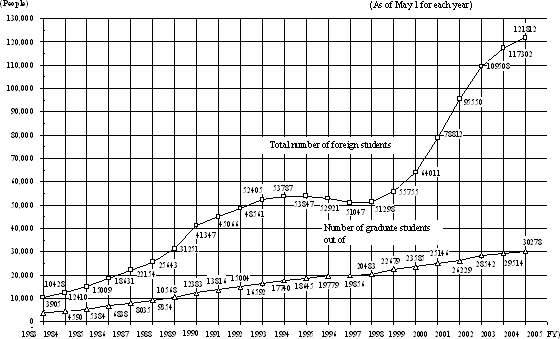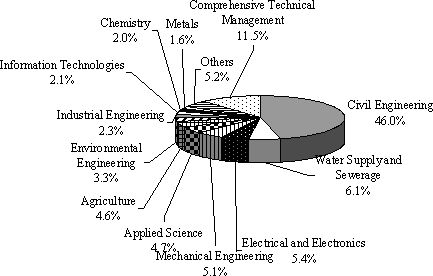3.3 Reform of Japan’s Science and Technology System
3.3.4 Development and Retention of Excellent Researchers and Engineers
3.3.4.1 Development of Researchers and Engineers; Reform of Universities
The development of excellent researchers and engineers is an extremely important issue within the reform of the science and technology system. Universities, which play the core role in that development, should step up the cultivation of researchers and engineers who possess abundant creativity and originality, have broad perspectives, and have acquired practical abilities. It is expected that universities will make various efforts to improve the quality of their education and research.
(1) Development of Human Resources at Universities
● Development of human resources with emphasis on graduate schools
Graduate schools promote learning that centers on theoretical research, and also play a role in developing researchers and other personnel with advanced expert skills. In Japan, about 80% of the 716 national, public and private universities in Japan have graduate schools attached, with a total of 558 schools (as of May 2005), and the total number of graduate school students at all national, public and private universities has been steadily increasing, to about 254,480 students as of May 2005 (Figure 3-3-17).

Figure 3-3-17 Trend in the number of graduate students
Note:
The numbers are as of May 1 of each fiscal year.
Source:
MEXT “School Basic Survey”
The report released by the Central Council for Education in September 2005, the “Graduate School Education in a New Age, Towards Development of Internationally Attractive Graduate School Education” called for measures to help substantialize graduate school education in Japan (the reinforcement of systematic development of school curriculum), and to improve their international acceptability and credibility.
In order to help strengthen the fostering function of young researchers who are rich in creativity and meet new needs of modern society, the Ministry of Education, Culture, Sports, Science and Technology started carrying out in FY2005 “Initiative Graduate School Education in Graduate School” which provides intensive support to graduate schools which are engaged in aggressive and original educational efforts.
Additionally, the ministry is implementing “Long term internship program for graduate students” which supports the development and implementation of long-term high-quality internship programs aimed to foster advanced human resources who will play central roles in research fields in graduate schools and corporate activities.
It is also important to conduct off-campus graduate level education by utilizing the facilities, equipment, and human resources of private research institutions that have high research standards. Because of this, graduate students may receive research guidance from research institutions other than their own if their graduate school deems it educationally beneficial (Standards for Establishment of Graduate Schools, Article 13). The number of collaborative graduate schools that conduct research guidance of graduate students through coordination between graduate schools and private research institutions reached 105 universities (national, public and private) with 206 research courses in FY2004, and the number continues to increase year by year. Furthermore, a system of professional schools that specialize in providing practical education for the cultivation of high level professionals was established in April 2003. As of FY2005, 122 schools have been established.
● Development of science and engineering-related human resources
In order to resolve the diverse problems confronting modern society, and in order to open the path toward a prosperous future society, Japan must create new science and technology. In addition, Japan is expected to exhibit still more leadership and creativity, and to contribute further to international society, toward the goal of becoming a nation of creative science and technology. To support such efforts, it is extremely important for Japan to develop richly creative human resources in the science and engineering fields.
Additionally, it is necessary to strive for the growth of the manufacturing industry, which serves as a vital lifeline for Japan, and thus to promote the fostering of practically-oriented personnel in order to support fundamental technologies for manufacturing.
Universities are making efforts such as reorganizing and restructuring of departments and establishing graduate courses in graduate schools, to cope with the recent rapid technological innovation and changes in industrial structure. Also, the number of universities and colleges of technology using the Engineer Education Program Accreditation System(Notes 29), which is implemented by the Japan Accreditation Board for Engineering Education (JABEE) from the perspective of improving the quality of engineer education in universities and colleges of technology, and ensuring the international suitability and commonality of engineering education, is increasing. In FY2004, 84 programs were newly certified, and the total number of certified programs has now reached 186.
Notes 29:
Engineer Education Program Accreditation System: A system
in which an external institution examines the contents of engineer education
in institutions of higher education such as universities and certifies education
programs fulfilling a certain level.
● Promotion of general education
General Education in universities must provide students a consolidated intellectual basis that can cope with rapid changes in society such as internationalization and progress in science and technology. Universities are expected to help the students to obtain knowledge and intellectual techniques such as thinking process commonly required beyond the borders of specialized fields, and to cultivate a profound insight in relation to the ideal way of existing and living for humans, and ability to accurately understand the realities.
Based on these points of view, the Ministry of Education, Culture, Sports, Science and Technology in FY2004 is supporting the active promotion of general education by universities through the implementation of necessary measures such as budgetary arrangements and information sharing, with the aim of expanding such education at universities. Universities are actively promoting general education courses by establishing courses of study with interdisciplinary and comprehensive content, as well as establishing classroom study incorporating internships and volunteer activities.
● Support for graduate students
To develop an environment in which exceptional graduate students can confidently proceed with their education, the Ministry of Education, Culture, Sports, Science and Technology works to support students in a number of ways, including the expansion of research scholarships provided by the “Research Fellowships for Young Scientists Program” of the Japan Society for the Promotion of Science (JSPS). Another is the expansion of teaching assistant (TA) programs for graduate students who excel. By having the TAs run educational assistance programs out of the educational concern of the Ministry, TA programs provide training opportunities to graduate students who will become future teachers and researchers and help assure undergraduate students receive individual and careful attention from their teachers. The Ministry also works to expand the scholarship program of the Japan Student Services Organization, which loans scholarships to exceptional students who need financial assistance with their studies in order to nurture personnel with the will and ability to lead the next generation (Figure 3-3-18).
In addition, research assistants are also promoted. Students with advanced standing in doctoral programs at graduate schools are made to participate in high-profile research projects undertaken by national universities, inter-university research institutes, and private universities. This develops the students’ abilities in carrying out research and also enhances the research system.
Moreover, to promote the research of scientists who have obtained competitive funding, the competitive funding system is being revised so as to allow the employment of doctoral students as a research expense. It is expected that the young researchers will develop into full-fledged researchers through participation in this research.

Figure 3-3-18 Trends in the total number of people (graduate students) receiving scholarships from the Japan Student Services Organization
Notes 1:
Figures include the number of scholarships budgeted each
fiscal year.
Notes 2:
Until FY2003, the scholarship program is implemented by
the Japan Scholarship Foundation.
Source:
Survey by MEXT
● Assistance for foreign students
The number of foreign students enrolled in Japanese institutions of higher education reached about 120,000, including about 30,000 graduate students (Figure 3-3-19).
On the other hand, the number of Japanese students studying abroad in universities and other institutions total 79 thousand in 33 major countries (FY2002), according to the statistics from the OECD and other sources.
The Ministry of Education, Culture, Sports, Science and Technology implements its policies in line with the fundamental direction shown in the report by the Central Council for Education in December 2003: () promotion of further exchange of students, such as accepting from and dispatching to foreign countries () reinforcement of support for Japanese students to study abroad () maintaining the quality of foreign students studying in Japan and enhancing the system to accept them.
Specifically, it founded a system for the long-term dispatch of students intending to obtain degrees such as doctors, and a scholarship system using loans for students studying abroad.
Efforts are made to accept foreign students with the focus on a graduate school level, such as a continuous approach to expand the acceptance of government-financed foreign students, as well as the enhancement of support to privately-financed foreign students by providing subsidies to encourage study for high-achieving students with a need for economic aid.

Figure 3-3-19 Trends in the number of foreign students in Japan
(2) Development of Human Resources at Colleges of Technology
Colleges of technology were established as institutions for higher learning that implement five-year programs designed to develop human resources with practical skills. The education results produced by these colleges of technology have been highly praised by industry and other corners. To fulfill the critical role of these educational institutions designed to develop practically skilled personnel with a rich capacity for creativity, colleges of technology are striving to expand upon further education, including the enhancement of “community-based” coordination based on the features and characteristics in each area. Moreover, in September 2005, the “Establishment Standard for Colleges of Technology” was revised, making it possible for each college of technology to design flexible curriculums based on originality and ingenuity.
(3) Development of Human Resources at Specialized Training Colleges
In order to support the development of human resources who will become the assets demanded by society, the Ministry of Education, Culture, Sports, Science, and Technology is implementing measures, including the development of e-learning and distance education between schools; the development of programs to respond to social needs; and the provision of financial assistance for the development of large-size education equipment and information processing-related facilities.
(4) Development of Human Resources at High Schools
Along with expanding “Super Science High Schools,” where curriculums that emphasize science and mathematics are being studied and developed, efforts for the planned development and expansion of science education equipment, such as experimental equipment in schools, are now in progress. Moreover, efforts are being taken to expand facilities and equipment for experimentation and practice, to promote vocational education that responds appropriately to changes in society. Additionally, MEXT is implementing the “Aspire to be a Specialist! (Super Specialized Upper Secondary Schools)” program, which assigns specialized upper secondary schools, such as industrial high schools that will be engaged in education adopting cutting-edge technologies and skills in coordination with industry and research institutions, etc. in the region.
3.3.4.2 Fostering Engineers
To become a science and technology-based country, it is necessary to create industrial frontiers and strengthen international competitive power through technological innovation, as well as to strengthen the technological foundation. For this purpose, efforts are being made to foster sufficient leading engineers through the following policies.
(1) Professional Engineer System
The Professional Engineer System was established with the enactment of the Professional Engineer Law in 1957 (revised in 1983). It aims to contribute to the improvement of science and technology and the development of the national economy through sound engineering, by conferring the qualification of “Professional Engineer” on those who possess advanced and specialized abilities in applying science and technology to planning and design work.
Those who apply to become a Professional Engineer are required to pass the national examination that is given in 21 fields of specialization, and become registered as a Professional Engineer. The examinations are held annually for both Professional Engineer and Associate Professional Engineer (Engineer in Training). In FY2005, the test resulted in 10,063 individuals being certified as Associate Professional Engineers, and 3,664 being certified as Professional Engineers. As of the end of December 2005, there were a total of 18,636 people registered as Associate Professional Engineers, and 56,748 registered as Professional Engineers. The distribution by sector is shown in Figure 3-3-20.
Based on deliberations by the Council for Science and Technology’s Subdivision on Professional Engineer, the Ministry of Education, Culture, Sports, Science and Technology revised the professional engineering test. Revised points included emphasis on oral questions on technological experiences of examinees, and the abolition of multiple choice questions. The revised test will be implemented in FY2007.

Figure 3-3-20 The distribution of professional engineers by the field of specialization (as of the end of December 2004)
(2) Mutual Exemption of Engineering Qualification
Based on the Osaka Action Agenda adopted at the APEC summit meeting of 1995, work has been progressing on the “APEC Engineer Mutual Recognition Project” for the promotion of mutual acceptance of engineer qualifications within the APEC region. Japan has actively participated in studies for this project, toward the realization of mutual recognition of the Professional Engineer qualification with corresponding qualifications overseas.
In November 2000, the “APEC Engineer Manual” was published based on the results of studies at APEC. As of June 2005, there were 13 participating economies in the register, including Japan.
Contacts
Research and Coordination Division, Science and Technology Policy Bureau
(Research and Coordination Division, Science and Technology Policy Bureau)




